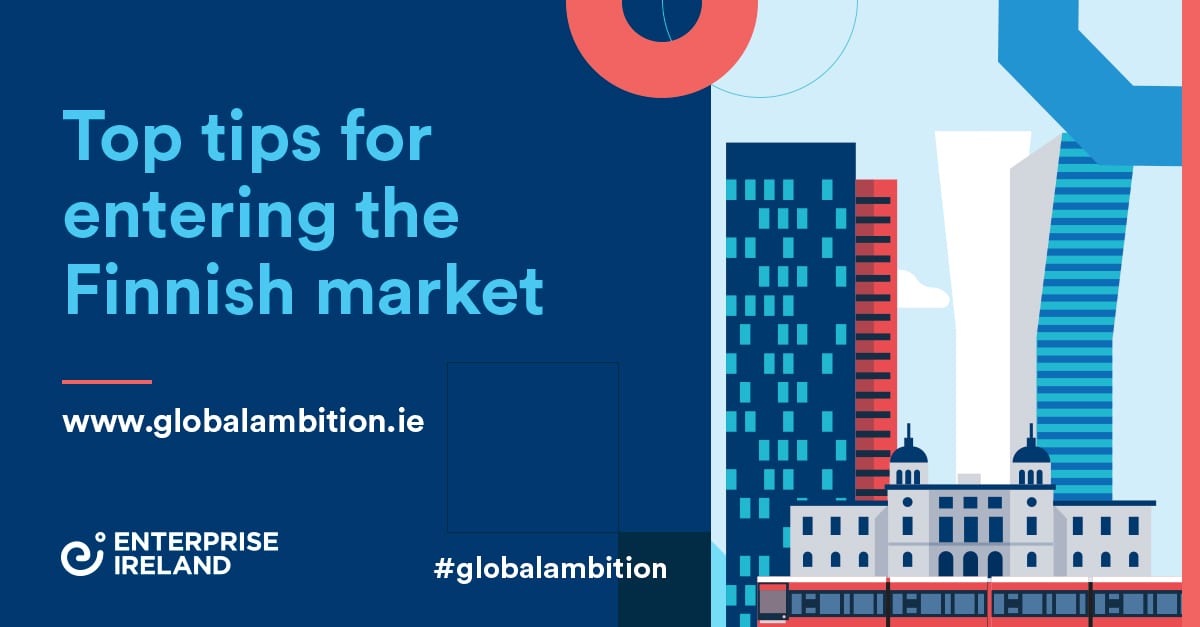
Finland adds appeal to Irish businesses who want to scale, and develop a presence within their sector overseas.
If you are considering doing business in Finland, the ten tips below will help aid you entering the market, as will our Nordics Team – located in both Stockholm & Copenhagen.
- Finland has an increasingly elderly population and is constantly looking for healthcare solutions, new talent & the creation of new jobs.
- The highest areas for growth and innovation in Finland are, Healthcare, marine industry, bioeconomy, energy, cleantech and environmental solutions
- Finland is almost 1,200 km long and only contains 5.5 million people, most of whom are in the South. Most headquarters are in the capital city region of Helsinki, Espoo & Vantaa. Other business hubs are Tampere and Turku.
- Finland has a high level of English, but don’t be fooled – this isn’t because Finnish is similar to English. Finnish is one of the hardest languages to learn in the world so if your product or service needs to be translated you may require a local partner or a team of translators. Swedish is the second official language of Finland, so certain products, such as food items, may require both.
The Nordics are a highly advanced region which rewards high quality and innovative solutions. These countries are familiar with collaboration and partnerships and often look globally to ensure that they have the best innovations on offer.
- Nordic business culture is based on equality, efficiency, modesty and punctuality.
- The Nordics are a hub for innovation – with more and more unicorns coming from the Nordics every year, the Nordics are home to some of the largest ICT & MedTech hubs in Europe.
- Business decisions take longer – generally, the Nordic countries operate on a consensus approach to business decisions and have flat organizational structures.
- If you plan on being in the Nordics long term, setting up an office in-market is necessary – as is localizing offerings (e.g. offering in local language)
- The Nordics are a detail-oriented market – make sure that you have the required accreditations & certificates and all specs of your product memorised, as you will need answers ready for highly-detailed questions (including any worst-case scenarios).
- Wait for an answer – People in the Nordics think carefully about what they are going to say before they say it, giving them their reputation as being ‘reserved’. They are comfortable with long silences and often speak only when there’s something worth saying, meaning you must give them a longer time to respond.
- References are required – having customer stories from within the Nordic region or from the U.S. will help gain trust and credibility from potential customers.
- Long-lasting Relationships – while it is a long process to build a trusting relationship, Nordic companies are usually in it for ‘the long-haul’ and are unlikely to change provider unless necessary.
- Highly Regulated – regulations across all sectors are among the strictest in Europe and often have higher expectations than the European Union in general.
- The environmental impact of business – the Nordics is a very environmentally aware market and environmental impact is something that many companies consider when entering new relationships and may set you apart from the competition.
Sweden
- As the 5th largest country in Europe, Sweden is drastically different in the North and South with different innovation hubs scattered throughout the country. Where is best for your offering is something that should be considered.
- Many Swedes go on an extended holiday during July, meaning that generally no new business is conducted from the 21st of June (‘Midsommar’) until the middle of August.
- Planning is essential to Swedes, so make sure to plan to meet before your arrangements for travelling.
Denmark
- Denmark is home to Medicon Valley the largest Lifesciences hub in Europe – second only to Silicon Valley in the world.
- Denmark is a world leader in Life sciences, cleantech and digitalization.
- Denmark is a rich, modern and design-focused country with a highly educated and critical population who are amongst the fastest to adopt new products/technologies
- The Nordics are known for high levels of employee protection, however, in Denmark, they operate on a ‘flexicurity’ model, where it is relatively easy to hire or fire someone, but they have a high level of social protection.
Norway
- Norway is not a member of the European Union but is part of the Inner Market through the EEA agreement
- Norwegians often disregard titles and symbols of power as they operate with flat structures and informal communication.
- Family comes first so afternoons and Fridays are very difficult to get a meeting as even senior management cuts their days short if they need to pick up children or be with their family.
- Most of the population is in Oslo, Bergen, Stavanger and Trondheim, with the North of Norway being sparsely populated.
- Distributors and agents are the most popular entry method into Norway – one must be careful to ensure their distributor can give focus and dedication to your product/service.
Enterprise Ireland is committed to helping Irish firms succeed in global markets and have industry experts on hand, ready to help you access the Nordic markets.


